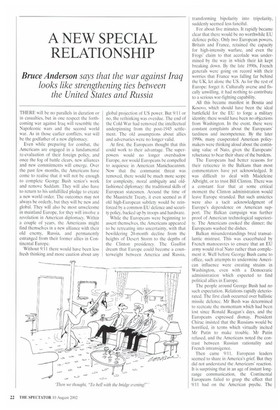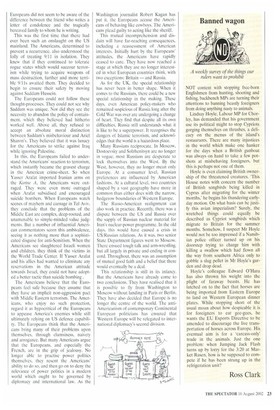A NEW SPECIAL RELATIONSHIP
Bruce Anderson says that the war against Iraq
looks like strengthening ties between the United States and Russia
THERE will be no parallels in duration or in casualties, but in one respect the forthcoming war against Iraq will resemble the Napoleonic wars and the second world war. As in those earlier conflicts, war will be the godfather of a new diplomacy.
Even while preparing for combat, the Americans are engaged in a fundamental re-evaluation of their foreign policy, and once the fog of battle clears, new alliances and new commitments will emerge. Over the past few months, the Americans have come to realise that it will not be enough to complete George Bush senior's work and remove Saddam, They will also have to return to his unfulfilled pledge to create a new world order. The outcomes may not always be orderly, but they will be new and global. They will also be most unwelcome in mainland Europe, for they will involve a revolution in American diplomacy. Within a couple of years, the Americans might find themselves in a new alliance with their old enemy, Russia, and permanently estranged from their former allies in Continental Europe.
Without 9/11 there would have been less fresh thinking and more caution about any global projection of US power. But 9/11 or no, the rethinking was overdue. The end of the Cold War had removed the intellectual underpinning from the post-1945 settlement. The old assumptions about allies and adversaries were no longer valid.
At first, the Europeans thought that this could work to their advantage. The superpowers would no longer overshadow Europe, nor would Europeans be compelled to acquiesce in American Manichaeanism. Now that the communist threat was removed, there would be much more scope for complexity, moral ambiguity and oldfashioned diplomacy: the traditional skills of European statesmen. Around the time of the Maastricht Treaty, it even seemed as if old high-European subtlety would be reinforced by a common EU defence and security policy, backed up by troops and hardware.
While the Europeans were beginning to assert themselves, the Americans appeared to be retreating into uncertainty, with that bewildering 20-month decline from the heights of Desert Storm to the depths of the Clinton presidency. The Gaullist dream that Europe could become a counterweight between America and Russia, transforming bipolarity into tripolarity, suddenly seemed less fanciful.
For about five minutes. It rapidly became clear that there would be no worthwhile EU defence policy. Only two European powers, Britain and France, retained the capacity for high-intensity warfare, and even the Frogs' claim to that accolade was undermined by the way in which their kit kept breaking down. By the late 1990s, French generals were going on record with their worries that France was falling far behind the UK, let alone the US. As for the rest of Europe: forget it. Culturally averse and fiscally unwilling, it had nothing to contribute to a serious war-fighting capability.
All this became manifest in Bosnia and Kosovo, which should have been the ideal battlefield for the EU to forge a military identity; there would have been no objections from Washington. In the event, there were constant complaints about the Europeans' tardiness and incompetence. By the later 1990s, many exasperated American policymakers were thinking aloud about the continuing value of Nato, given the Europeans' reluctance to bear their share of the burdens.
The Europeans had better reasons for their reticence in the Balkans than most commentators have yet acknowledged. It was difficult to deal with Madeleine Albright, or to trust Bill Clinton. There was a constant fear that at some critical moment the Clinton administration would leave Europe stranded. But such anxieties were also a tacit acknowledgment of Europe's dependence on American support. The Balkan campaign was further proof of American technological superiority. The Americans cooked the dinner: the Europeans washed the dishes.
Balkan misunderstandings bred transatlantic mistrust. This was exacerbated by French manoeuvres to ensure that an EU army would rival Nato rather than complement it. Well before George Bush came to office, such attempts to undermine American influence were creating strains in Washington, even with a Democratic administration which expected to find political allies in Europe.
The people around George Bush had no such expectation. Relations rapidly deteriorated. The first clash occurred over ballistic missile defence. Mr Bush was determined to recreate the momentum which had been lost since Ronald Reagan's days, and the Europeans expressed dismay. President Chirac insisted that the Russians would be horrified, in terms which virtually incited Mr Putin to make trouble. Mr Putin refused, and the Americans noted the contrast between Russian rationality and French intransigence.
Then came 9/11. European leaders seemed to share in America's grief. But they did not understand the Americans' reaction. It is surprising that in an age of instant longrange communication, the Continental Europeans failed to grasp the effect that 9/11 had on the American psyche. The Europeans did not seem to be aware of the difference between the friend who writes a letter of condolence and the tragically bereaved family to whom he is writing.
This was the first time that there had ever been such an onslaught on the US mainland. The Americans, determined to prevent a recurrence, also understood the folly of treating 9/11 in isolation. •They knew that if they continued to tolerate rogue states which would succour terrorism while trying to acquire weapons of mass destruction, further and more terrible 9/11s awaited them. They decided to begin to ensure their safety by moving against Saddam Hussein.
The Europeans could not follow these thought-processes. They could not see why Saddam was unique. Nor did they see the necessity to abandon the policy of containment. which they believed had hitherto worked well. Above all, they refused to accept an absolute moral distinction between Saddam's misbehaviour and Aridl Sharon's. They believed that it was lunacy for the Americans to strike against Iraq while ignoring Palestine.
In this, the Europeans failed to understand the Americans reaction to terrorism, which instantly became the gravest charge in the American crime-sheet. So when Yasser Arafat imported Iranian arms on the Karine A, the Americans were outraged. They were even more outraged when Arafat subsidised and encouraged suicide bombers. When Europeans watch scenes of mayhem and carnage in Tel Aviv, they conclude that the problems of the Middle East are complex, deep-rooted, and unamenable to simple-minded value judgments. But a number of influential American commentators scorn this ambivalence, seeing it as nothing more than a sophisticated disguise for anti-Semitism. When the Americans see slaughtered Israeli women and children, they think of the victims in the World Trade Center. If Yasser Arafat and his allies had wanted to eliminate any reservations in the American attitude towards Israel, they could not have adopted a better tactic than suicide bombing The Americans believe that the Europeans feel safe because they assume that they have an implicit non-aggression pact with Middle Eastern terrorism. The Americans, who enjoy no such protection, regard it as hypocritical of the Europeans to appease America's enemies while still ultimately relying on US defence capability. The Europeans think that the Americans bring many of their problems upon themselves, through clumsiness, naivety and arrogance. But many Americans argue that the Europeans, and especially the French, are in the grip of jealousy. No longer able to practise power politics themselves, they resent the Americans' ability to do so, and then go on to deny the relevance of power politics in a modern world which ought to be governed by diplomacy and international law. As the Washington journalist Robert Kagan has put it, the Europeans accuse the Americans of behaving like cowboys. The Americans plead guilty to acting like the sheriff.
This mutual incomprehension and disdain will have far-reaching consequences, including a reassessment of American interests. Initially hurt by the Europeans' attitudes, the Americans have rapidly ceased to care. They have now reached a stage at which they are no longer interested in what European countries think, with two exceptions: Britain — and Russia.
As for the UK, the special relationship has never been in better shape. When it comes to the Russians, there could be a new special relationship in the making. These days, even American policy-makers who remained suspicious of Russia long after the Cold War was over are undergoing a change of heart. They find that despite all its own difficulties, Russia still understands what it is like to be a superpower. It recognises the dangers of Islamic terrorism, and acknowledges that the world is a hazardous place.
Many Russians reciprocate. In Moscow, Dostoevsky and Solzhenitsyn are no longer in vogue; most Russians are desperate to lock themselves into the West. By the West, however, they no longer mean only Europe. At a consumer level, Russian preferences are influenced by American fashions. At a cultural level, two countries shaped by a vast geography have more in common than either does with the narrow, hedgerow boundaries of Western Europe.
The Russo-American realignment can also work in practice. Recently, there was a dispute between the US and Russia over the supply of Russian nuclear material for Iran's nuclear-power programme. In the old days, this would have caused a crisis in US/Russian relations. As it was, two senior State Department figures went to Moscow, There ensued tough talk and arm-wrestling, but all largely in private and ending in concord. Throughout, there was an assumption of mutual good faith and a belief that there would eventually be a deal.
This relationship is still in its infancy. But the Americans have already come to two conclusions. They have realised that it is possible to fly from Washington to Moscow without landing in Paris or Berlin. They have also decided that Europe is no longer the centre of the world. The antiAmericanism of contemporary Continental European politicians has ensured that Western Europe will be relegated to international diplomacy's second division.



























































 Previous page
Previous page